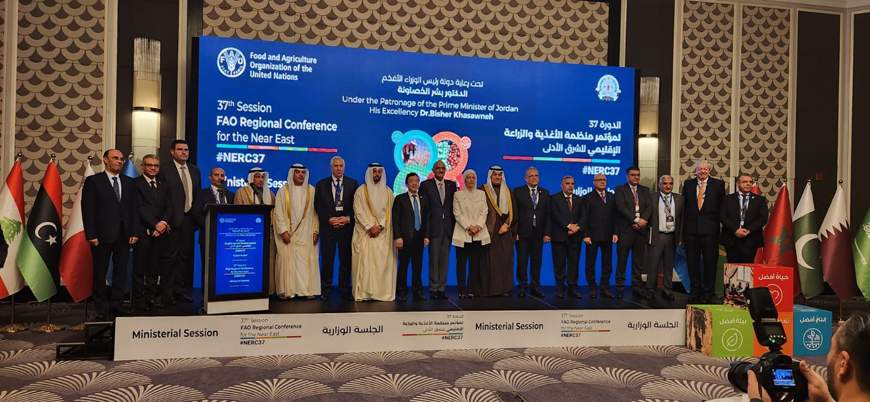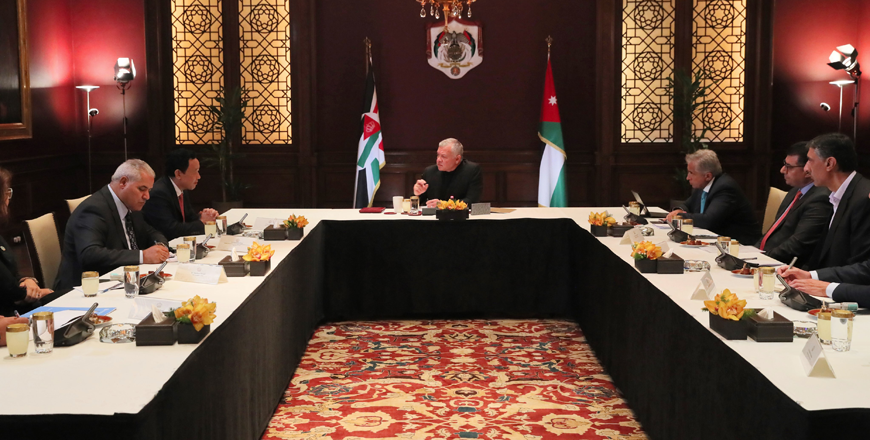You are here
37th FAO regional ministerial conference opens, focusing on transforming agricultural food systems
By Heba Elayyan - Mar 04,2024 - Last updated at Mar 04,2024

The 37th session of the FAO Regional Ministerial Conference for the Near East, a biennial event organised in collaboration with the Ministry of Agriculture, opens on Monday in Amman (Photo courtesy of the FAO)
AMMAN— The 37th session of the FAO Regional Ministerial Conference for the Near East, a biennial event organised in collaboration with the Ministry of Agriculture, opened on Monday in Amman.
The conference, themed “Accelerating the Transformation of Regional Agricultural Food Systems to Achieve Sustainable Agriculture and Food Security Amidst the Multiple Crises Facing the Region”, was attended by Prime Minister Bisher Khasawneh, FAO Director-General Qu Dongyu and Agriculture Minister Khalid Hneifat.
Ministers and leaders from across the region were participating in the conference to establish a regional framework for cooperation and collective action to achieve sustainable agricultural food systems and ensure food security for millions in the region.
During the opening ceremony, Qu Dongyu expressed gratitude to His Majesty King Abdullah, the government, and all supporters for their proactive role in organising the conference.
He also voiced concerns regarding the Israeli war on Gaza and its "severe impact on human life, livelihoods, and food security".
The situation in Gaza, coupled with protracted crises in Sudan, Syria, and Yemen, is of "great concern", Dongyu said.
Dongyu conveyed sympathies to those affected and urged a swift resolution to protect peace, food security, and the dignity of the land.
He also announced FAO’s active participation in relief and rebuilding efforts in Gaza, emphasising the organisation’s role as the first UN principal to make an official statement following the UN Head of State political declaration.
“In November 2023, the FAO issued a call for $20 million through the UN Interagency Flash Appeal. The organization plans to revive the production of perishable, highly nutritious foods that cannot be imported as food aid. This includes items such as fresh milk, meat, and vegetables,” Dongyu said.
Khasawneh highlighted the devastating consequences of the Israeli war on Gaza, saying that the aggression has resulted in the deaths of over 30,000 civilians, a majority of whom are women and children, with approximately 60,000 wounded.
He also said that due to the Israeli actions, Gaza is on the verge of famine and malnutrition, hindering the delivery of essential medical services, and violating international and humanitarian laws.
Khasawneh stated that Israel’s actions have resulted in widespread destruction in the city, disrupting essential food supplies and leading to the displacement of over 2 million Palestinians. “These individuals are now facing severe circumstances, struggling with a lack of access to clean water, starvation, and the absence of electricity,” he added.
Drawing on satellite imagery, Khasawneh pointed out that Israeli attacks have led to the destruction of 40 per cent of Gaza’s agricultural lands and 70 per cent of its infrastructure.
He underscored Jordan’s humanitarian efforts, which have so far resulted in 25 airdrops of aid into Gaza since the outbreak of the war on October 7, with an additional 10 facilitated in partnership with allied countries.
He also said, “The Jordanian airdrops have given rise to a new international culture of protecting the afflicted and championing humanity in exceptional circumstances, thereby strengthening a humanitarian trend in the global consciousness.”
The conference, held amidst regional challenges and global crises like the coronavirus pandemic and the economic downturn in Russia, aims to develop mechanisms that strengthen agriculture and foster integration between countries, Khasawneh said.
Based on the most recent data from the FAO, hunger in the Arab states peaked in 2022, marking its highest level since the turn of the millennium. The number of undernourished individuals reached 59.8 million, signifying a 75.9 per cent increase from the year 2000. This figure represents 12.9 per cent of the population, a rate that significantly surpasses the global average of 9.2 per cent.
Nabil Assaf, FAO representative in Jordan, emphasised the conference’s objective of reviewing sector accomplishments and devising a roadmap for the upcoming decade. He also noted the escalating challenges in the region, including water scarcity, conflicts and a growing demand for high-quality food, which pose significant hurdles for countries striving to secure their food supply.
In response to a question from the Jordan Times about FAO’s plans for Gaza, Ahmed Mokhtar, senior economist and regional programme leader at the FAO Regional Office for Near East and North Africa, reaffirmed the organisation’s unwavering commitment to providing aid.
He also assured that the FAO is steadfast in its efforts to deliver essential supplies to the region despite challenges at the Rafah border crossing.
Related Articles
AMMAN — His Majesty King Abdullah on Monday received UN Food and Agriculture Organisation Director General Qu Dongyu, and discussed enhancin
AMMAN — His Majesty King Abdullah on Tuesday received a delegation from the United Nations Food and Agriculture Organisation (FAO) at Basman
AMMAN — Prime Minister Bisher Khasawneh on Monday announced the launch of the Regional Food Security Observatory for the region.The decision















